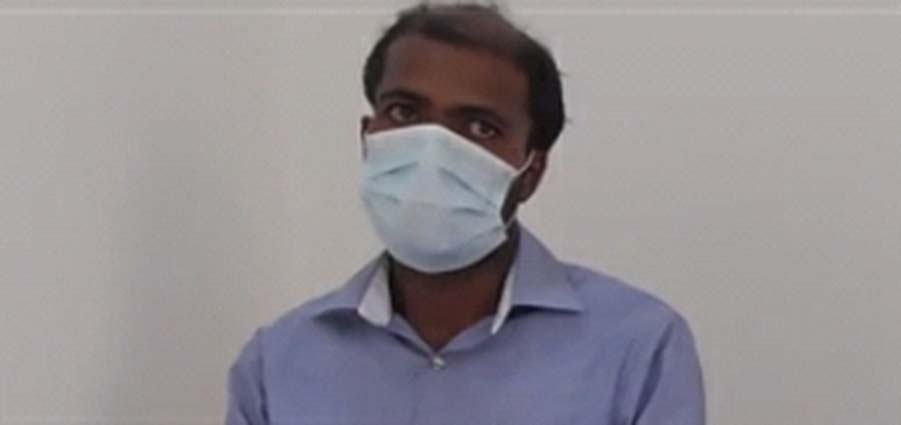Forty-one-year-old boatman, Vickram Persaud was yesterday sentenced to 20 years behind bars for the 2009 rape of a young woman whom he took to a location other than where she had paid him to be taken.
Earlier this month a jury had convicted the boat captain of sexually penetrating the woman without her consent, but his sentencing had been deferred for a probation report and victim impact statement.
At the hearing yesterday afternoon, the court heard of the effect the assault continues to have on the complainant who, through her court-support officer, spoke of constantly being plagued by depression.
Senior Social Worker, Ranesha Garnett-Calendar, who read the complainant’s impact statement, said that the complainant’s trust has been fractured because of what Persaud has done to her, to the extent that she finds it difficult to trust other persons as well.
The court heard from Garnett-Calendar that the young woman still suffers from flashbacks which petrifies and makes her feel unsafe.
The statement detailed, too, that though the perpetrator had been found guilty, the complainant still feels afraid of him because of being constantly bombarded by his family who had been in the habit of calling and threatening her, and offering payment for her to discontinue the matter.
She has, however, indicated that there has been some relief knowing that Persaud will no longer be walking the streets freely; though she is said to have noted that no prison sentence could provide solace for the psychological scars with which she has to live for the rest of her life.
Now in a consensual relationship, the mother of two, the court heard, is often haunted by thoughts of her children being abused as well.
Meanwhile, from the probation report read by Probation and Social Services Officer Zola Cameron-Lubin, the court heard that Persaud is still vehemently denying the charge and professing his innocence, despite the verdict of his peers.
Prior to imposing sentence, Justice Brassington Reynolds had said that Persaud’s lack of remorse and disregard for the jury’s verdict were doing him no good for the Court’s consideration of leniency.
In Cameron-Lubin’s report, she said that members of the community had described the offender as respectful and expressed shocked at the charge levelled against him.
Describing the offence as despicable and a scourge in the Guyanese society—with some males having scant regard for the dignity of the bodies of women and girls—Justice Reynolds said that the Court must send a strong message of deterrence.
The judge said he initially wanted to impose a sentence of life imprisonment, but owing to defence attorney Nirvan Singh’s plea in mitigation that his client had no previous brushes with the law, and the probation officer’s report of the challenging childhood Persaud had, he considered 20 years to be appropriate instead.
The judge, however, made it clear that no credit would be given for what he called the “barbaric” act committed on the complainant by the offender.
Justice Reynolds said that the Court needed to “set its face against” such conduct which affronts the values, laws and norms of society so that potential offenders are deterred.
The judge noted that for 12 years Persaud had enjoyed his liberty, all while the complainant had to endure the trauma and still has to.
Following the sentencing, Persaud who described himself as well-respected in his community, asked the judge to address the court during which he continued professing his innocence, calling the conviction “meritless.”
He said that the conviction has been the worst challenge he has ever had to deal with even as he begged for mercy.
While the judge give him a listening ear, Justice Reynolds made it clear to Persaud that the Court had already passed its sentence and that his address would have no weight.
The prosecution’s case had been that the complainant was travelling in a boat piloted by Persaud when she observed that he had diverted and was going in a direction, other than where her destination should have been.
The court had heard that the young woman began protesting and screaming, but against her will, the accused took her to an unknown creek location which she described as “bushy” and “muddy.”
Prosecutor Sarah Martin who led the state’s case had noted that the accused dragged the young woman atop a hill location. The young woman had told the court during the trial that she tried to loosen the man’s grip, but he threatened to strangle her if she did not stop crying and shouting.
She started to cry and beg for him to not do her anything, the court had been told, but that he instead started to fight with her to take off her clothes.
The prosecutor had detailed that the accused eventually pushed the young woman on the ground while she tried fighting to push him off of her. She said that she held on to her pants so that he could not take it off but he eventually succeeded.
It was at this point the young woman said that her attacker succeeded in sexually penetrating her without her consent.
The trial proceedings were held in-camera at the Sexual Offences Court of the High Court in Georgetown.






